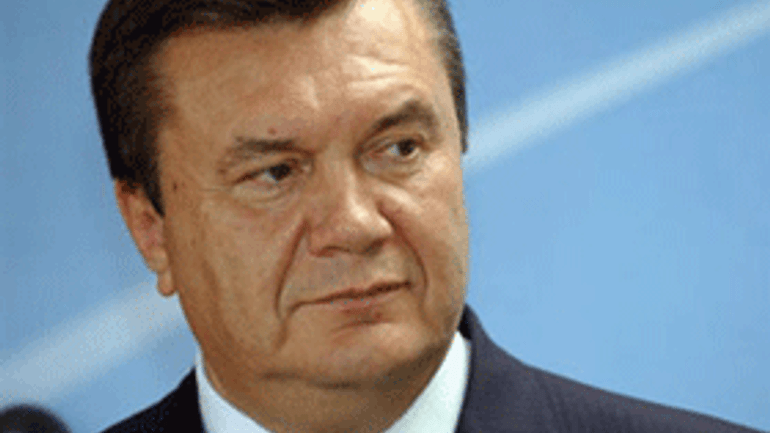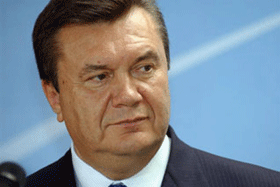Yanukovych answers questions of US Atlantic Council members

 Answering questions of US Atlantic Council members, President of Ukraine Viktor Yanukovych noted that democracy excludes oppression of citizens on any grounds. The language issue here is no exception, ForUm reports. "Society understands that. As to the question of the coexistence of people who speak Ukrainian and those who speak Russian, first of all, they do not differ from each other. Therefore, no matter which language people speak, they all want to live normally. I think our country is not the only one where such a question exists. This exists in many countries. But in developed democracies, these issues were resolved long ago.
Answering questions of US Atlantic Council members, President of Ukraine Viktor Yanukovych noted that democracy excludes oppression of citizens on any grounds. The language issue here is no exception, ForUm reports. "Society understands that. As to the question of the coexistence of people who speak Ukrainian and those who speak Russian, first of all, they do not differ from each other. Therefore, no matter which language people speak, they all want to live normally. I think our country is not the only one where such a question exists. This exists in many countries. But in developed democracies, these issues were resolved long ago.
"There is the European Language Charter. Ukraine is a member of the Parliamentary Assembly of the Council of Europe and observation of the charter creates conditions for the coexistence of any peoples who speak any language. In Ukraine, people speak not only Ukrainian and Russian. There are people who speak Hungarian, Romanian, Bulgarian, Greek, Jewish, etc.. There are about 120 nationalities living in Ukraine. Ukraine is a very international state, and today the problem is to create equal conditions for all people who live here and have Ukrainian citizenship.
"Multiculturalism makes Ukraine even more interesting, and oppression of culture, one or another, in modern society is impossible. We recognize that and apply it in our public policy. In other words, implementation of the European Language Charter in Ukraine is on the agenda. We are doing just that.
"Another very important aspect of public policy is state interference in church affairs or matters of religion.
"As I said in my report, Ukraine, like any other state, has its features and it definitely takes some time for people to find ways to coexist on one territory.
"We have many places where different people live and we have no problems in these areas. And only when times of election come, politicians bring up these issues and foster this policy," said Viktor Yanukovych.
When asked about the Orange Revolution, the president of Ukraine, said: "When the Orange Revolution began and I heard those pleas,which the leaders of the Orange Revolution addressed the people with, they were very familiar to me, and I liked them. During the political struggle of the 2004 election, I had no evil thoughts. I felt that it was a regular competition, the winners in which would assume responsibility for the country. Having dedicated much of my life to sports, I have gotten used to competing by rules. But the means that were used against me were against the rules of the game. It certainly had a negative impact on me as a person and on the voters who supported me. You probably all know I will not be dwelling on that, how those elections ended. Much more important was what the Orange Revolution leaders were saying and what did they then. This could be a subject for a separate major conference. But to be brief, I would say that there were more negative effects than positive ones.
"During these five years, the Ukrainian nation has made its conclusions. And by our actions today we show an example of how things should have been done by the 'orange team.'
"As to positive things, they surely were done. And these positive things happened, above all, in the minds of people. People have started feeling more free; they have begun to freely express their views on how they wish to live.
"I recognize that democratic heritage of the Orange Revolution and believe it must be continued. But let us not speak about negative things. They have passed. We have already turned this page.”
When asked about the interaction of ministries and departments in Ukraine, the president said: "You know that I have spent much time of my life being a manager of industrial enterprises. For nearly 20 years I had been working as a chairman of various enterprises.
It is very important today that there were clear national regulators in the work of all ministries. Let us take tax policy, social policy, and the participation of business in social policy. The form of ownership has virtually no role today. We have become accustomed to the fact that most enterprises of different ownership forms and industries perform the same functions. I did emphasize that we are pursuing liberalization of tax policy, liberalization of the permit system. State management has many components. As for domestic policy, we are creating and will continue to create all the conditions for business to develop. As for foreign policy, then surely we defend the interests of domestic producers, because we export about 60% of our products.
As you are aware, we use a well-known model of development – the investment and innovation model. So, it is very important for us to intensify the processing of raw materials which are available in Ukraine. In order to improve financial results and create more jobs, we must produce more products with increased added value.
In all these areas, the state policy will be aimed at addressing these issues. We have been creating a broad range of government agencies, dealing, for example, with investment, and working with investors.
I see many familiar faces at this meeting. These people have come to Ukraine to work. I am grateful to them. I know who had difficulties and what difficulties there were. But we always try to help and are gradually upgrading our state machinery so that it is conducive to the development of investment, business and the state. "









